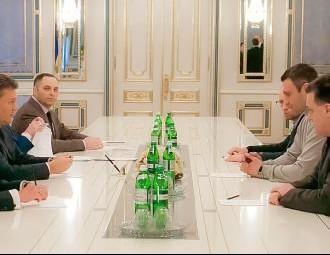Yanukovich is ready for concussions, but people do not leave Maidan

Ukrainian President has finally voiced a number of concussions which, he believes, can be a first step to stop political confrontation in Ukraine.
On January 25 Ukrainian President Viktor Yanukovich has offered the prime minister's post to leading opposition leader Arseniy Yatsenyuk. Another opposition leader, Vitali Klitschko, was offered the post of deputy prime minister.
Justice Minister Olena Lukash, who attended talks on January 25 between Yanukovich and the three main opposition leaders -- Yatsenyuk, Klitschko, and Oleh Tyahnybok - said in a statement after the meeting that if Yatsenyuk decides to accept the offer then the government will resign, RFE/RL informs. The statement said Yanukovich also agreed to consider changes to the constitution.
The talks were held amid a weeks-long standoff between thousands of anti-government protesters and riot police in central Kyiv and other parts of the country. Earlier, Ukrainian authorities confirmed one more anti-government protester has died as a tense standoff between protesters and riot police continues in Kyiv and unrest spreads throughout the country.
The situation was mostly calm in Kyiv early on January 25 after sporadic clashes overnight. Protesters occupied the Energy Ministry building, but left after several hours.
Police accused protesters of holding two police officers captive in Kyiv's city hall which protesters have occupied, and demanded their immediate release. Protesters deny they are holding the officers.
Interior Minister Vitaliy Zakharchenko accused the mainstream opposition of failing to control radicals and claimed protesters were "hoarding firearms" at the Kyiv city hall.
Meanwhile, Ukraine's richest man, Rinat Akhmetov - a key backer of President Viktor Yanukovich - has said the use of force was "unacceptable."
On January 25, protesters stormed the regional administration offices in the town of Vinnytsia, southwest of Kyiv. Protesters are already occupying government offices in several cities in western Ukraine.
EU Enlargement Commissioner Stefan Füle, in Kyiv to try to mediate a solution, urged the government to take concrete steps to halt the violence. Füle met on January 24 with both Yanukovich and the three main opposition leaders.
On January 24 Yanukovich also promised reformatting of government and amnesty to participants of protest actions, who did not commit grave crimes, UNIAN reported. However, he also said he would use all legal measures to end protests “for people’s sake”.
-
03.01
-
07.10
-
22.09
-
17.08
-
12.08
-
30.09










































